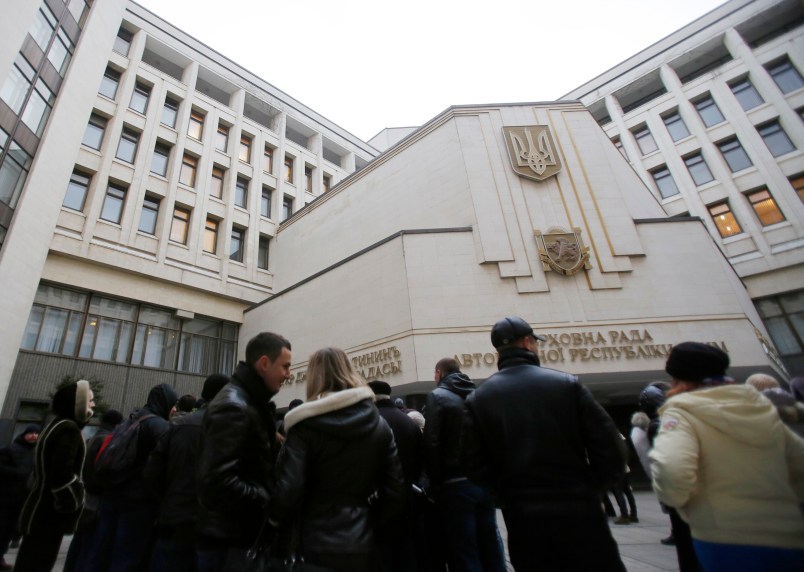SIMFEROPOL, Ukraine (AP) — Police struggled to keep apart rival groups holding competing rallies Wednesday in Ukraine’s largely pro-Russian Crimea region where the regional parliament was to hold a crisis session on the turmoil that has gripped the country.
Over 10,000 Muslim Crimean Tatars rallied in support of Ukraine’s interim leaders, waving Ukrainian flags and chanting “Ukraine is not Russia” and “Allahu Akbar,” while a smaller pro-Russian rally nearby called for stronger ties with Russia and waving Russian flags.
Police and leaders from both sides were struggling to keep the two groups apart, as protesters shouted and punched each other in ongoing scuffles.
The tensions in Crimea — a peninsula jutting into the Black Sea that is strategically critical region because it is home to Russia’s Black Sea Fleet — highlight the divisions that run through this country of 46 million after months of protests that ultimately forced the pro-Russia President Viktor Yanukovych to flee the capital. It also underscores fears that the country’s mainly Russian-speaking east will not recognized the interim authorities’ legitimacy.
Crimean Tatars took an active part in the protest movement against Yanukovych and harbor deep resentment against the Kremlin, having been deported en masse on the orders of Soviet dictator Josef Stalin during the World War II.
“We will not let the fate of our land to be decided without us,” said Nuridin Seytablaev, 54, an engineer. “We are ready to fight for Ukraine and our European future.”
Nearby, separated by police lines, Anton Lyakhov, 52, waved a Russian flag. “Only Russian can defend us from fascists in Kiev and from Islamic radicals in Crimea.”
On Tuesday, a Russian lawmaker visiting Crimea said Moscow would protect the region’s Russian-speaking residents, raising concern that Russia could be trying to justify military action.
Valentina Matvienko, speaker of the Federation Council, the upper chamber of the Russian parliament, on Wednesday dismissed claims that Russia could conduct a military operation in Ukraine. “That scenario is impossible,” she said.
“Russia has been stating and reiterating its stance that we have no right and cannot interfere in domestic affairs of a sovereign state,” said Matvienko, a close Putin ally who was born in western Ukraine. “We are for Ukraine as a united state, and there should be no basis for separatist sentiments.”
Meanwhile, Ukraine’s acting interior minister on Wednesday ordered the disbandment of a feared riot police force that many accuse of attacks on protesters during the country’s three-month political turmoil.
Arsen Avakov wrote on his Facebook page that he has signed a decree to disband the force known as Berkut and said more detail would be announced later.
Anti-government protesters have blamed Berkut for violent attacks against peaceful demonstrators protesting authorities’ decision to ditch closer ties with the European Union and turn to Moscow instead. Those attacks galvanized long-brewing anger against police and the protests quickly grew into a massive movement, attracting crowds exceeding 100,000 and establishing an extensive tent camp in the capital’s main downtown square.
The force, whose name means “golden eagle,” consisted of about 5,000 officers. It was unclear Wednesday if its members would be dismissed or if they would be reassigned to other units.
Yanukovych and protest leaders signed an agreement last week to end the conflict that left more than 80 people dead in just a few days in Kiev. Shortly after, Yanukovych fled the capital for his powerbase in eastern Ukraine but his exact whereabouts are unknown.
On Wednesday, Yanukovych’s three predecessors as Ukraine’s president issued a statement accusing Russia of “direct interference in the political life of Crimea.”
The turmoil has raised concern that Ukraine is facing a split between Russian-speaking regions, which include Yanukovych’s home area in the east, and the Ukrainian-speaking west.
___
Associated Press writers Maria Danilova and Jim Heintz in Kiev contributed to this report.
Copyright 2014 The Associated Press. All rights reserved. This material may not be published, broadcast, rewritten or redistributed.



